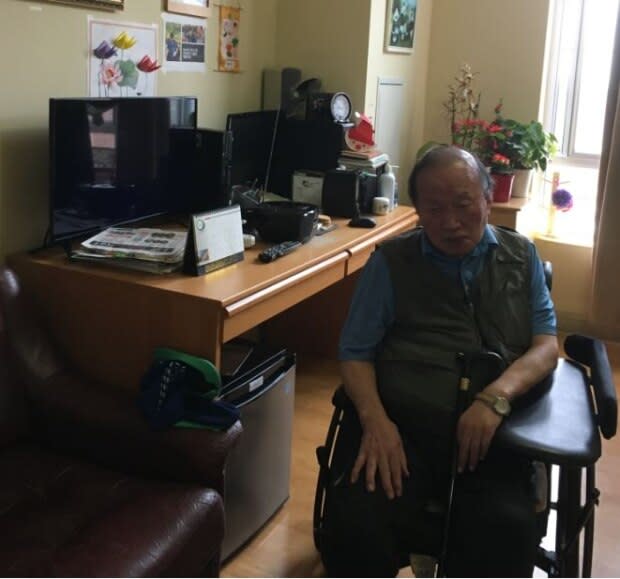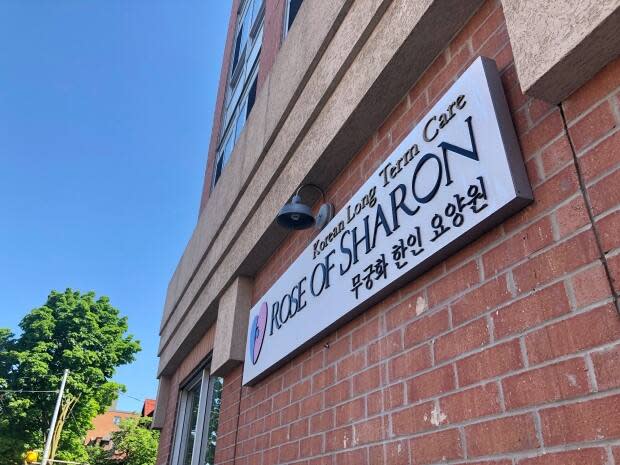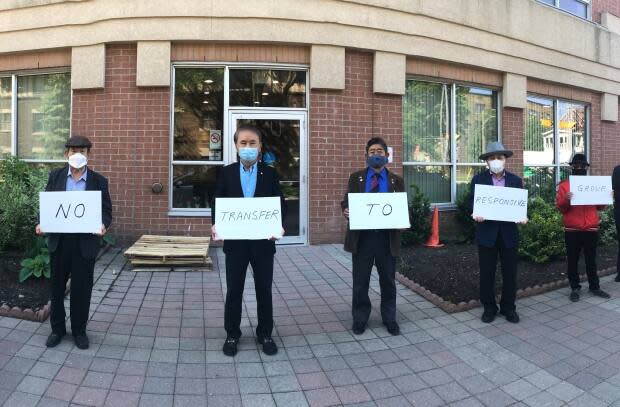Korean community fights sale of its only nursing home to firm with 115 COVID-19 deaths in 3 facilities
Hae Kee Min says one of the best decisions she ever made was getting her husband a bed at Rose of Sharon Korean Long-Term Care Home after caring for him on her own for 22 years.
Her husband was paralyzed in a car accident in 1994 and Min, 82, cared for him for as long as she could by herself. Seven years ago, she needed extra help and put her husband on the waitlist for a bed at Rose of Sharon. The couple waited for more than three years, but Min says it was worth it.
"Since then, my husband is so settled. He likes it here and I am so happy," she said in an interview in front of the home near Bathurst Street and St. Clair Avenue West.
Min is also the president of Rose of Sharon's resident family council and says she, along with other family members and the larger Korean-Canadian community, is deeply concerned that Rykka Care Centres is poised to take over Rose of Sharon.
Rykka, which is an operating partner of Responsive Group, has seen a combined 115 COVID-19-related deaths in three of its homes. Responsive Group operates 11 long-term care centres and three retirement homes in Ontario.
Rykka purchased Rose of Sharon in December, eight years after the home went into receivership. The sale is conditional on Ontario's Ministry of Long-Term Care approving the licence transfer, which many in the community are strongly against, given the company's handling of the COVID-19 outbreak.
Rose of Sharon hasn't had one confirmed COVID-19 case, according to its administrator and management company Assured Care. Both declined to comment on the sale.
Since the pandemic, the province has taken over two homes owned by Rykka, Eatonville and Hawthorne Place, which were also included in a scathing report by the Canadian military. The two homes and a third, Anson Place, have been named in lawsuits alleging negligence in protecting residents and staff from COVID-19.
The allegations in those lawsuits have not been proved in court.

"It has become evident that Responsive Group has horrendous management deficiencies," said Dr. Donald Kim, a kidney specialist and volunteer who promotes health among the Korean-Canadian community.
"It may be an experienced seniors' housing operator, but that experience is, in fact, deplorable," Kim added.
Min says she was more scared than worried when she learned how Rykka was dealing with COVID-19 and is pleading with the province to reject the transfer of the licence.
"Please do not let it happen. This is not right," Min said, holding back tears.
Ministry still reviewing transfer
Ontario's Ministry of Long-Term Care says it received the application to transfer the licence last month and is currently reviewing it. No decision has been made.
A spokesperson for Minister of Long-Term Care Merrilee Fullerton says the review will align with the requirements of the Long-Term Care Homes Act, and will include public consultation.
"The public consultations are for anyone — including long-term care home residents, families, staff and other community members — to provide their opinions on a proposed licensing transaction relating to a long-term care home," Gillian Sloggett wrote in an email.
The public consultation process for Rose of Sharon hasn't started yet.

In a written statement to CBC News, Rykka Care Centres and Responsive Management Inc. (RMI) says it understands the purchase is occurring during an "unprecedented moment in Ontario's history."
Rykka is ensuring homes have the resources and tools needed to provide a "comfortable and enriching environment," the company says.
"Most of the homes that we manage have been successful at keeping COVID-19 at bay," the statement reads.
Rose of Sharon is the only long-term care home dedicated to serving the Korean community in Ontario, according to Kim. It focuses on Korean culture, serves traditional food, organizes Korean activities and the staff speak the language.
Kim said there are about 100,000 Koreans in the GTA and only 60 beds at Rose of Sharon. With a waitlist longer than seven years, he says many non-English speaking Koreans are in homes where they can't speak or understand the language.

"I just feel very sad about that," he said.
"In comparison to the availability of long-term care to the mainstream society at large and other ethnic and cultural groups, it's really obvious that Korean-Canadians are really under-serviced."
Will be 'carrying on the traditions' at home, Rykka says
The community is worried the focus on Korean culture will be lost if Rykka takes over the home, and is concerned it won't keep the Korean-speaking staff.
"It's not qualified to provide culturally sensitive care as it already permits abusive and inappropriate behaviour in non-culturally specific homes," Kim said.
Min worked as a personal support worker for 28 years in Toronto long-term care homes and says Rose of Sharon is the only one she'd send her husband to.
"This is one of the best ones, I know, inside and out."
In its statement to CBC News, RMI says it's committed to providing a comfortable home for residents that offers the care and attention they deserve.
"We look forward to carrying on the traditions of this unique residence, continuing to provide excellent care and services to the Korean community," the statement reads.
A history rooted in culture
The concept for Rose of Sharon, named after Korea's national flower, began in 1986 through a provincial request for proposals for more ethno-cultural long-term care beds in Ontario.
By 2010, construction was nearly complete, but the builder ran into financial difficulty related to retirement residences within the home, not the long-term care portion.

Rose of Sharon went into receivership in 2011 and a closed bidding process began in 2017. The Korean-Canadian community sprang into action and appointed the non-profit Arirang Age-Friendly Community Centre (AAFC) to buy the home.
In three months, $3.5 million was raised, mostly from the Korean-Canadian community, but the group lost out to Rykka.
Kim is on the AAFC board and gets emotional when he talks about the community coming together to raise an "unprecedented" amount of money in an effort to save the home and look after its seniors.
"It is our hope of creating a new future on solid footing led by members raised and educated in Ontario," he said, his voice breaking.
"The Korean community very much wants to have a chance to reacquire Rose of Sharon to use that as a springboard to expand its seniors programs."


